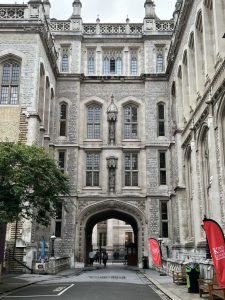
By WanTing Wong, 3rd Year Chemistry with Biomedicine MSci
Since high school, chemistry and biology have been my favourite subjects, but what truly fascinated me was how chemistry plays a role in human diseases. Thus, when choosing a university course, Chemistry with Biomedicine at King’s stood out to me as a no-brainer, as it is one of the only programmes to integrate both of my passions, allowing me to explore and gain skills in diverse growing fields such as bioengineering, pharmacology, and biomedicine.
Beyond academics, studying in London means being in the centre of global scientific innovation, with access to varied career opportunities, including assorted cultural and entertainment offerings.
What Makes Chemistry at King’s Unique?
The bio-focused modules bridge chemistry with real-world applications in medicine and biotechnology. Modules like Chemistry of Disease and Therapy explore the role of Chemistry in drug development, whereas Advanced Analytical Chemistry presents analytical techniques like mass spectrometry to study proteins. These interdisciplinary modules equip students with the necessary skills and knowledge for careers in biotechnology, medicine, pharmacy, and more.
Another aspect of the Chemistry Department here at King’s that I’ve grown to appreciate is the focus on student education and knowledge retention. There is a familiar stereotype that university professors prioritise research over teaching, and while that isn’t entirely inaccurate, many chemistry academics here at King’s are also interested in Chemistry Education, which means their lectures and module structure are more suited to helping students understand the content, instead of memorising and regurgitating for the exam.

Lab sessions
We have plenty of scheduled laboratory sessions (typically once every week) that encourage hands-on experience in applying diverse chemistry disciplines taught in the classrooms, from synthesizing banana oil in Organic Chemistry to spectroscopy analysis in Physical Chemistry. Alongside lab sessions, we complete lab reports that test not only our understanding but also our ability to communicate findings concisely. It may seem daunting to write more than a paragraph as a STEM student, but learning how to communicate complex concepts concisely is an invaluable skill appreciated in any field!

Life at Waterloo Campus
When you think of King’s, the historical Strand Campus or maybe the cosmopolitan Guy’s Campus comes to mind. But, for Chemistry Students, our main campus is in Waterloo. Although we may not have the adorable Leonard Cat of Guy’s Campus nor the illustrious Maughan Library, the Waterloo Campus is still extremely well-equipped, with state-of-the-art laboratories, computer rooms, and lecture halls, as well as located at close distance to many entertainment options like the London Southbank, National Theatre and, Tate Modern!

Challenges
The Workload, Is It Manageable?
As expected, Chemistry is a demanding course. Often along with your scheduled lectures, workshops, laboratory sessions, and reports, you will be expected to tackle 2 – 3 module related coursework per semester, all with packed deadlines. But, don’t let this scare you! With good time management and study techniques, it is possible to balance academics and social life.
My biggest tips:
- Chisel away the coursework slowly instead of leaving everything until the deadline.
- Studying with your friends – Teaching concepts to each other reinforces understanding and keeps everyone accountable.
- Attend office hours! Whether clarifying lecture material or seeking feedback, these sessions help you connect with lecturers, who can also offer valuable academic and career insights.
Adjusting to University-Life
Moving to university, especially in a city like London, can feel overwhelming, especially if it’s your first time living independently. One thing that helped me settle in was connecting with people from similar backgrounds. Societies are a great way to meet people, whether through cultural groups, sports clubs, or hobby-based societies. University can be challenging, but remember: taking breaks is just as important as studying. Burnout is real, so make time for things you enjoy!

Advice for Prospective Chemistry Students
Find Your Interests
Read around the subject and discover which aspects of Chemistry you appreciate most; if you enjoyed learning about the elemental reactions of the periodic table, Inorganic Chemistry might be your cup of tea, whereas if you prefer carbon and its diverse reactions, Organic Chemistry may be for you instead. There are other specialisations within Chemistry, like Green Chemistry, Analytical Chemistry, and more! Regardless, a general idea of which parts you enjoy will help you choose a course that interests you. If you’re still undecided, no worries! All accredited Chemistry courses will cover essential aspects of Chemistry to give you a well-rounded foundation in Chemistry.
Brush up on Mathematics
Despite the lack of “Mathematics” in the course title, we (un)fortunately cannot escape its dominance in the natural world. So honing your Calculus skills and Physics knowledge would be extremely beneficial when you start learning more about Physical and Computational Chemistry.
Final Thoughts
Studying Chemistry with Biomedicine at King’s is an exciting and intellectually rewarding journey. While the workload can be intense, the hands-on lab experience, interdisciplinary learning, and support from passionate academics make it an enriching experience worth pursuing. If you’re considering this course, embrace the challenge, stay curious, and take advantage of the resources available to you.
I hope this guide has given you valuable insight into what to expect and maybe even inspired you to join the King’s Chemistry community!
Good luck on your academic journey, and who knows? Maybe I’ll see you around campus!

Leave a Reply